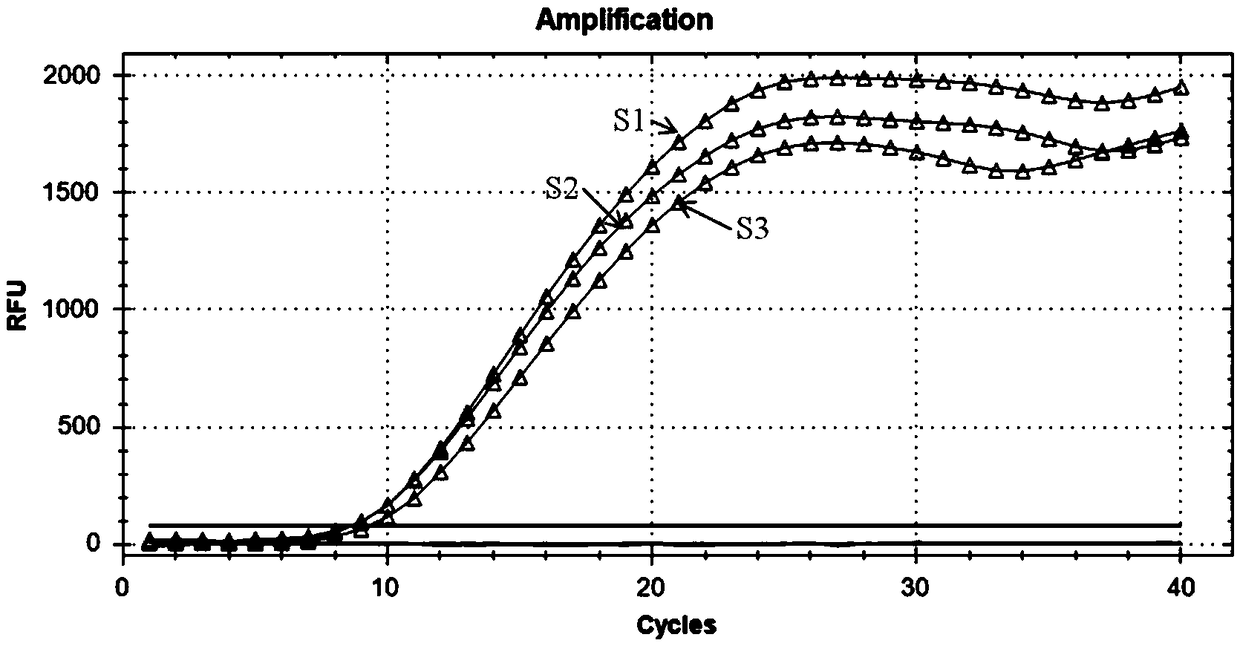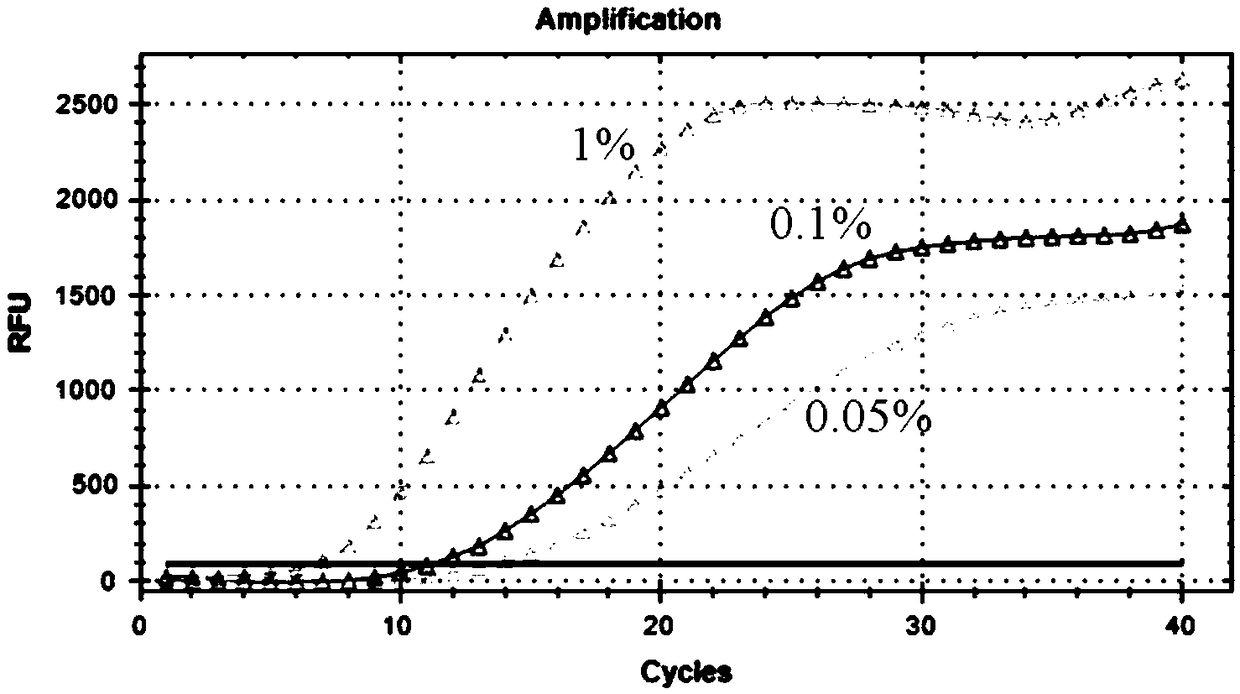Primer, probe, kit and method for detecting transgenic soybean MON89788
A technology of MON89788 and transgenic soybean, applied in the field of molecular biology, can solve the problems such as the detection method and kit for detecting transgenic soybean MON89788, etc., and achieve the effect of simple operation and strong specificity
- Summary
- Abstract
- Description
- Claims
- Application Information
AI Technical Summary
Problems solved by technology
Method used
Image
Examples
Embodiment 1
[0030] Example 1 Design and screening of primers and probes for detection of transgenic soybean MON89788RPA
[0031] The target region detected by MON89788RPA in the present invention is the transformant-specific sequence of MON89788, that is, the sequence of the junction region between the exogenous insert and the soybean genome. The forward and reverse primers are located on both sides of the junction, and the probe covers the connect area.
[0032] (1) Primer design
[0033] 5 primers were respectively designed on both sides of the connection point, and the length of the primers was 30-32bp. The sequences of the screening primers of the present invention are as follows:
[0034] F1: GTTTTCCATACTTGATTTGTCCCTTGGCT;
[0035] F2: TCTAAGTTTGAGCTCGTTACTGCTGCCCCAC;
[0036] F3: CCTCGAAACTTGTTCCTGTCCCACTCTTCCT;
[0037] F4: TTGTTCCTGTCCCACTCTTCCTTTTTGGGCTT;
[0038] F5: CTTCCTTTGGGCTTTTTTGTTTCCCGCTCT;
[0039] R1: TACCCTGACCTTGTTGAGGCTTTGGACTGA;
[0040] R2: GAATTAGCTTCCACTC...
Embodiment 2
[0049] The optimization of embodiment 2 RPA reaction system
[0050] (1) Determination of amplification temperature
[0051] Under the condition that other amplification conditions of RPA are the same, carry out RPA amplification in the temperature range of 30-45°C, determine the optimal amplification temperature of RPA according to the strength of the fluorescence signal intensity at different temperatures, and finally determine the optimal amplification The temperature was 39°C.
[0052] (2) Determine the concentration of primers and probes
[0053] Primers and probes were prepared at the same concentration, 10 μmol / L, and other amplification conditions of RPA were the same. Amplification was performed at the optimum amplification temperature of 39°C, and primers and probe combinations with different concentrations were amplified. The strength of the fluorescent signal intensity under the combination determines the optimal primer and probe concentration of RPA, and finally...
Embodiment 3
[0054] Example 3 The establishment of the kit and its detection method
[0055] The RPA detection kit of transgenic soybean MON89788 was prepared according to the following formula, and the specification of each kit was 50 reactions:
[0056] (1) Detection primer and probe solution: Synthesize forward primer F, reverse primer R and probe P, and prepare the dry powder of primer and probe with sterilized deionized water or ultrapure water with a concentration of 10 μmol / L respectively. Mother liquor, wherein the primer sequences are:
[0057] Forward primer F: CTTCCTTTTGGGCTTTTTTGTTTCCCGCTCT (SEQ ID NO: 1);
[0058] Reverse primer R: GAGCTTGATGGGGATCAGATTGTCGTTTCC
[0059] (SEQ ID NO: 2);
[0060] Probe P: CGCTTCAATCGTGGTTATCAAGCTCCAAACAC[FAM-dT][THF]A[BHQ1-dT]AGTTTAAACTGAAGGC-C3Spacer (SEQ ID NO: 3).
[0061] (2) BufferA (1.5mL): containing 50mmol / L Tris-HCl, pH 8.4, 80mmol / L KAc, 2mmol / LDTT, 3mmol / L ATP, 200μmol / L dNTPs, 20mmol / L C 4 h 10 N 3 o 5 P, 100ng / μL creatine k...
PUM
 Login to View More
Login to View More Abstract
Description
Claims
Application Information
 Login to View More
Login to View More - R&D
- Intellectual Property
- Life Sciences
- Materials
- Tech Scout
- Unparalleled Data Quality
- Higher Quality Content
- 60% Fewer Hallucinations
Browse by: Latest US Patents, China's latest patents, Technical Efficacy Thesaurus, Application Domain, Technology Topic, Popular Technical Reports.
© 2025 PatSnap. All rights reserved.Legal|Privacy policy|Modern Slavery Act Transparency Statement|Sitemap|About US| Contact US: help@patsnap.com


